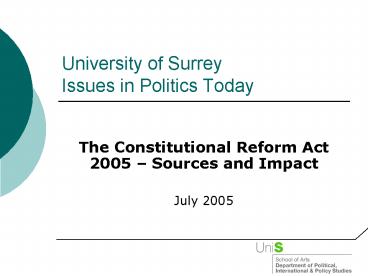University of Surrey Issues in Politics Today - PowerPoint PPT Presentation
1 / 23
Title:
University of Surrey Issues in Politics Today
Description:
Issues in Politics Today. The Constitutional Reform Act 2005 Sources and ... www.surrey.ac.uk/politics. Questions for debate. Was the CRA 2005 necessary? ... – PowerPoint PPT presentation
Number of Views:77
Avg rating:3.0/5.0
Title: University of Surrey Issues in Politics Today
1
University of SurreyIssues in Politics Today
- The Constitutional Reform Act 2005 Sources and
Impact - July 2005
2
Contents
- Background the Changing Constitution
- Why a Constitutional Reform Act?
- What does the CRA do?
3
The Changing Constitution
- The UK lacks a single, codified constitution,
unlike most other states - BUT it does have numerous constitutional texts
and practices
4
The Sources of the Constitution
- Statute Law (e.g. Bill of Rights, Parliament
Acts) - Common Law (e.g. royal prerogative powers)
- Convention (e.g. the PMs powers)
- Law Custom of Parliament
- International Sources (e.g. EU, European
Convention on Human Rights)
5
Constitutional Change
- Constantly changing Constitution
- 18th Century Aristocratic balanced
constitution - 19th Century middle-class liberal constitution
- 20th Century liberal democratic constitution
- Compare 1688 and 2005 notionally same
constitution, but much change
6
Labour Constitutional Reform
- Since 1997, Labour have engaged in the most
significant amount of constitutional reform since
19th Century - Effects have been far-reaching and little
understood
7
Labours Changes (1)
- Devolution (Scotland, Wales, Northern Ireland,
London, Elected Mayors) - Electoral Change (European Parliament)
- New Basic Rights (Human Rights Act 1998, Freedom
of Information Act 1999)
8
Labours Changes (2)
- Institutional Reform
- House of Lords (still underway)
- Changes to Party Funding
- Modernisation of House of Commons
- Constitutional Reform Act 2005
9
Labours Changes (3)
- Important to note that Labour has never has a
grand plan of reform instead a problem-based
approach - Limited popular appeal, but a relic from Old
Labour - Currently, reform is uneven, incomplete and lacks
a clear goal
10
What happened?
- The first steps towards the CRA came in 2003,
without any warning or consultation - PM Blair announced a Cabinet reshuffle in June
2003, abolishing the post of Lord Chancellor - Quickly developed into a wider set of reforms
11
The Lord Chancellor
- Originally an appointment of the Crown
- Gradually developed overlapping powers
- Member of Cabinet
- Head of Judiciary
- Speaker of House of Lords
12
Why abolish the Lord Chancellor?
- Desire to increase separation of powers between
judges and government - Ensure compliance with Art.6 of ECHR (on judicial
independence) - Part of wider modernisation agenda
- BUT no pressing need for change
13
The Governments agenda
- During 2003, Labour developed a Constitutional
Reform Bill - Abolish the Lord Chancellor and his department,
replace with Secretary of State for
Constitutional Affairs - Set up Supreme Court to replace Law Lords
- Changes to appointment of judges
14
Progress of the Bill
- Lack of consultation beforehand caused much
difficulty in both Houses and with public - Lords made many amendments
- Bill finally approved March 2005
15
Constitutional Reform Act 2005 (1)
- Lord Chancellor remains, but with much less power
over judiciary and no longer automatically
Speaker of Lords - Title will usually be held by the Secretary of
State for Constitutional Affairs - Holder can come from either House
16
Constitutional Reform Act 2005 (2)
- New Supreme Court formed, with independently
appointed members - Will move into new buildings in Middlesex
Guildhall in 2008 - Lords will lose its judicial functions
17
Constitutional Reform Act 2005 (3)
- Creation of Judicial Appointments Commission
- Will recommend appointments to Secretary of
State, on basis of merit - Will work on an independent and transparent basis
18
Constitutional Reform Act 2005 (4)
- Establishment in law of principle of judicial
independence - Government ministers now barred from trying to
influence judicial decisions by virtue of special
access
19
What are the consequences? (1)
- On the positive side
- The CRA 2005 moves the UK towards a system of
separation of powers - Government control over judges should decrease
- Separation of functions should allow for better
specialisation - Strengthens respect of European Convention on
Human Rights
20
What are the consequences? (2)
- On the negative side
- Extra institutions and positions will make
coordination more difficult - The process by which the CRA 2005 was reached
undermined public confidence in the political
process - Appears to set up many teething problems to fix a
problem that was not very problematic
21
The future
- Hard to see much more major constitutional reform
occurring under Labour (although the CRA 2005 was
itself unexpected) - In longer run, will become another step in the
gradual evolution of the British Constitution
22
Questions for debate
- Was the CRA 2005 necessary?
- Does it solve the problems it set out to?
- How could the process have been improved?
23
Further Resources
- Department for Constitutional Affairs -
www.dca.gov.uk - Parliament - www.parliament.uk
- The UCL Constitutional Unit - www.ucl.ac.uk/consti
tution-unit - The Hansard Society - www.hansardsociety.org.uk































